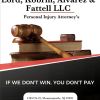- 1-Understanding-Creditors-Claims-in-Probate
- 2-The-Legal-Process-of-Notifying-Creditors
- 3-Priority-of-Debt-Payments-During-Probate
- 4-Real-Cases-of-Creditor-Claims
- 5-Steps-Executors-Should-Take
- 6-Working-with-Legal-Experts
- 7-Preventing-Common-Mistakes-in-Probate
- 8-Fred-Miller-Lawyer-Recommendations
Understanding Creditors’ Claims in Probate
How to Handle Creditors’ Claims During Probate is one of the most important questions executors and families face when a loved one passes away. Probate is not only about distributing assets to heirs—it is also a legal process to ensure creditors are fairly treated. If debts are ignored or mishandled, executors can face legal consequences and heirs may experience unnecessary delays.
The Legal Process of Notifying Creditors
Formal notification requirements
Each state requires executors to notify creditors within a certain timeframe. This often involves publishing a notice in a local newspaper and sending direct communication to known creditors. This step starts the clock on deadlines for creditors to file their claims against the estate.
Why deadlines matter
Creditors generally have a limited time window to file. If claims are not submitted within that period, they may lose the right to collect. Executors must document these timelines carefully to avoid disputes.
Priority of Debt Payments During Probate
How debts are ranked
Not all debts are equal under probate law. Funeral expenses, administrative costs, and taxes usually take priority over credit card debt or personal loans. Executors must follow this hierarchy strictly, or risk legal challenges from creditors.
Impact on heirs
If the estate lacks enough assets to cover all debts, some heirs may receive less than expected—or nothing at all. Clear knowledge of the debt hierarchy helps manage family expectations during this difficult time.
Real Cases of Creditor Claims
A credit card company dispute
In one case, an executor failed to notify a credit card company of probate proceedings. The company later sued, extending the probate process by months and reducing the heirs’ inheritance. This illustrates why timely notice is critical.
A hospital bill claim
Another family faced a large medical bill filed against the estate. With proper legal guidance, they negotiated a reduced settlement, preserving more of the estate for beneficiaries. These real stories highlight how strategy matters in handling creditor claims.
Steps Executors Should Take
1. Identify debts early
Executors should gather all financial records quickly, including bank statements, loan agreements, and bills. Early organization prevents surprises later in the probate process.
2. Verify legitimacy of claims
Not all claims are valid. Executors should carefully review documentation and challenge any that appear fraudulent or exaggerated. Courts allow disputes when evidence supports the estate’s position.
3. Communicate transparently with heirs
Families often misunderstand why creditor claims reduce inheritances. Executors should explain the legal obligations clearly to avoid conflicts or suspicions of mishandling.
Working with Legal Experts
Because probate laws vary by state and creditor claims can become contentious, legal expertise is invaluable. Attorneys specializing in probate guide executors through each step, from notifying creditors to distributing remaining assets. This professional oversight ensures the process remains compliant and fair.
Preventing Common Mistakes in Probate
Failure to follow deadlines
Missing notification or filing deadlines can result in costly lawsuits. Executors must stay organized and meet all statutory requirements.
Improper asset distribution
Executors who distribute assets to heirs before satisfying creditor claims risk being held personally liable. Careful sequencing of payments prevents these mistakes.
Fred Miller Lawyer Recommendations
At Fred Miller Lawyer, clients receive clear, practical strategies for How to Handle Creditors’ Claims During Probate. From navigating complex state rules to negotiating creditor settlements, expert legal guidance provides peace of mind. Families can focus on healing while knowing the estate is managed responsibly and efficiently.

 marrone law firm philadelphia pa
marrone law firm philadelphia pa attorney skye lazaro
attorney skye lazaro 899 logan st denver co 80203
899 logan st denver co 80203 alvarez elizabeth nj
alvarez elizabeth nj flynn law office
flynn law office ronald shook
ronald shook